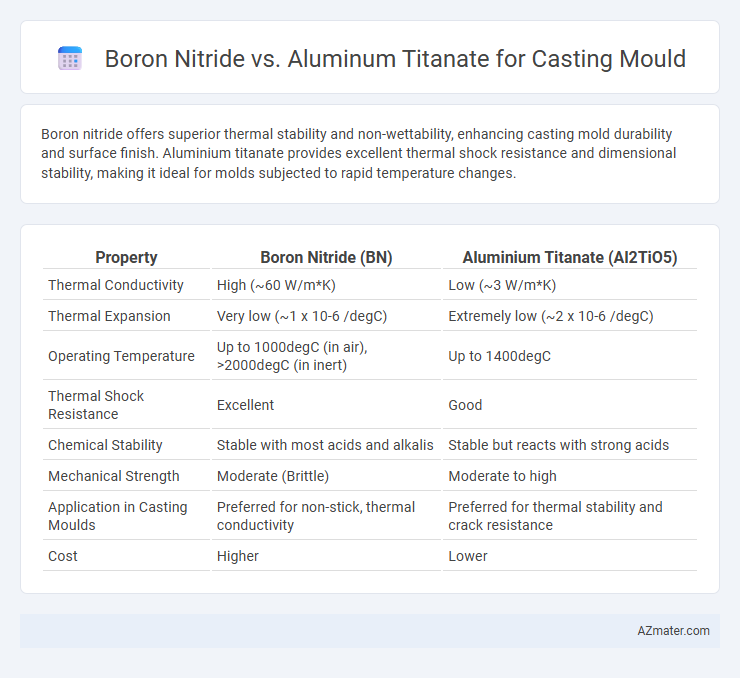Boron nitride offers superior thermal stability and non-wettability, enhancing casting mold durability and surface finish. Aluminium titanate provides excellent thermal shock resistance and dimensional stability, making it ideal for molds subjected to rapid temperature changes.
Table of Comparison
| Property | Boron Nitride (BN) | Aluminium Titanate (Al2TiO5) |
|---|---|---|
| Thermal Conductivity | High (~60 W/m*K) | Low (~3 W/m*K) |
| Thermal Expansion | Very low (~1 x 10-6 /degC) | Extremely low (~2 x 10-6 /degC) |
| Operating Temperature | Up to 1000degC (in air), >2000degC (in inert) | Up to 1400degC |
| Thermal Shock Resistance | Excellent | Good |
| Chemical Stability | Stable with most acids and alkalis | Stable but reacts with strong acids |
| Mechanical Strength | Moderate (Brittle) | Moderate to high |
| Application in Casting Moulds | Preferred for non-stick, thermal conductivity | Preferred for thermal stability and crack resistance |
| Cost | Higher | Lower |
Introduction to Boron Nitride and Aluminium Titanate
Boron nitride is a ceramic material known for its excellent thermal stability, non-stick properties, and high thermal conductivity, making it ideal for casting mould coatings where heat resistance and release quality are critical. Aluminium titanate exhibits superior thermal shock resistance and low thermal expansion, which helps in maintaining structural integrity under rapid temperature fluctuations during the casting process. Both materials enhance casting mould performance, but their specific thermal and mechanical properties suit different aspects of mould design and application.
Material Properties Overview
Boron nitride exhibits excellent thermal stability up to 1000degC, outstanding lubricity, and chemical inertness, making it ideal for casting molds requiring non-stick surfaces and high-temperature resistance. Aluminium titanate offers superior thermal shock resistance, low thermal expansion, and good mechanical strength, which enhances mold durability under rapid temperature changes. Both materials provide unique benefits: boron nitride excels in surface treatment and non-wettability, while aluminium titanate improves dimensional stability and longevity in demanding casting environments.
Thermal Conductivity Comparison
Boron nitride exhibits a high thermal conductivity of approximately 60 W/m*K, enabling rapid heat dissipation during casting processes and reducing thermal stress on moulds. In contrast, aluminium titanate possesses a much lower thermal conductivity around 3-4 W/m*K, which provides superior thermal shock resistance by minimizing heat transfer rates. Selecting boron nitride or aluminium titanate for casting moulds depends on balancing the need for efficient heat removal with the requirement for thermal shock durability.
Resistance to Thermal Shock
Boron nitride exhibits superior resistance to thermal shock compared to aluminium titanate, making it highly effective in casting mould applications where rapid temperature changes occur. Its excellent thermal stability and low thermal expansion minimize cracking and deformation during repeated heating and cooling cycles. Aluminium titanate, while resistant to thermal shock, generally has higher thermal expansion and lower thermal conductivity, which can increase the risk of thermal stress in moulds.
Chemical Stability in Casting Environments
Boron nitride exhibits exceptional chemical stability in casting environments, resisting oxidation and corrosion even at temperatures exceeding 1000degC, which ensures long service life and minimal chemical interactions with molten metals. Aluminium titanate offers good thermal shock resistance but can undergo phase transformations at high temperatures that may compromise its chemical stability during repetitive casting cycles. Boron nitride's inert nature and low reactivity with common casting alloys make it a superior choice for maintaining mold integrity in harsh chemical conditions.
Wear and Erosion Resistance
Boron nitride offers superior wear and erosion resistance for casting molds due to its hardness and chemical inertness, enabling longer mold lifespan under high thermal and mechanical stress. Aluminium titanate provides thermal shock resistance but tends to have lower wear resistance, making it more prone to surface degradation and erosion during repeated casting cycles. Selecting boron nitride enhances mold durability and reduces maintenance frequency in demanding casting applications.
Impact on Casting Quality and Defect Rates
Boron nitride's exceptional thermal stability and non-wettability lead to superior surface finish and reduced casting defects such as porosity and oxidation, enhancing overall casting quality. Aluminium titanate's low thermal expansion minimizes thermal shock and cracking in molds, improving dimensional accuracy but may increase the risk of surface blemishes due to its rougher texture. Selecting boron nitride typically results in lower defect rates and higher-quality castings compared to aluminium titanate, especially in precision applications requiring fine surface detail.
Cost Effectiveness and Availability
Boron nitride offers exceptional thermal stability and non-stick properties ideal for casting molds but is generally more expensive and less readily available than aluminium titanate. Aluminium titanate provides good thermal shock resistance and a lower cost alternative, making it more cost-effective for large-scale casting applications. Availability of aluminium titanate is higher due to its widespread industrial use, contributing to better supply consistency compared to boron nitride.
Applications in Modern Casting Technologies
Boron nitride excels in casting molds due to its exceptional thermal stability, non-stick properties, and chemical inertness, making it ideal for precision casting of reactive and high-melting-point metals like titanium and superalloys. Aluminium titanate offers superior thermal shock resistance and low thermal conductivity, which benefits molds used in rapid cooling processes such as die casting and investment casting of aluminum and magnesium alloys. Both materials enhance mold longevity and surface finish quality in modern casting technologies, with choice depending on specific casting metal properties and thermal cycling demands.
Choosing the Right Material for Your Mould
Boron nitride offers superior thermal stability and excellent release properties, making it ideal for high-temperature casting molds requiring smooth surface finishes. Aluminium titanate provides excellent thermal shock resistance and low thermal expansion, ensuring dimensional stability during rapid heating and cooling cycles in casting processes. Selecting the right material depends on the specific casting application, balancing the need for thermal durability, mold longevity, and surface quality.

Infographic: Boron nitride vs Aluminium titanate for Casting mould
 azmater.com
azmater.com